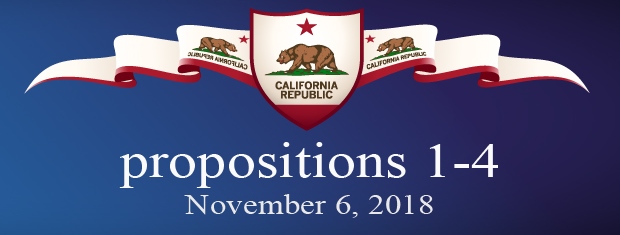California Ballot Guide 2018: Propositions 1-4
Fall is officially here. It’s time to start thinking about mid-term elections and how to vote on various California ballot measures November 6, 2018. Since many of these may become law and affect both our business and consumer clients, we’re providing a summary of each.
Each measure’s synopsis highlights the arguments for and against the initiative, with reference links for our clients and other readers to follow for more information.
In this series, we’ll start with the first four of the 11 statewide ballot propositions, as they concern various general obligation bonds.

Proposition 1: Authorizes Bonds to Fund Specified Housing Assistance Programs, a/k/a Veterans and Affordable Housing Bond Act of 2018
This measure intends to address the affordable housing crisis in California by selling bonds to fund specific housing programs, loans, and grants. Proposition 1 aims to raise $4 billion, disbursed to:
- CalVet Home Loan Program: $1 billion for loans to veterans purchasing homes, farms, cooperative units or mobile homes.
- Multifamily Housing Program: $1.5 billion for loans to construct, rehabilitate or preserve rental housing for individuals earning 60 percent or below of median incomes.
- Transit-Oriented Development Implementation Fund: $150 million for loans and grants to local governments and developers for housing projects near bus, train stations.
- Regional Planning, Housing, and Infill Incentive Account: $300 million to provide grants for new construction and rehabilitation in “infill” locations – sites that have been previously developed or surrounded by development.
- Home Purchase Assistance Program: $150 million to assist low and medium income homebuyers with loans.
- Joe Serna, Jr. Farmworker Hosing Grant Fund: $300 million to finance construction, rehabilitation or acquisition of agricultural worker housing.
- Local Housing Trust Matching Grant Fund: $300 million in dollar-for-dollar matching grants for the creation or preservation of affordable housing.
- Self–Help Housing Fund: $300 million for forgivable loans for mortgage assistance, multiple home ownership units development, and manufactured homes.
Voting YES on Prop 1:
Proposition 1 supporters say the measure if passed, will enable the building of emergency housing, create more opportunities for working families to own homes, and provide supportive environments for people with disabilities or are victims of domestic violence. Additionally, supporters project an economic boost for the state via tens of thousands of jobs, and a shot for public health by limiting the spread of disease, e.g. the Hepatitis A outbreak in 2017.
Voting NO on Prop 1:
The opposition to Proposition 1 claims the measure will just raise state debt that will ultimately be paid with interest by taxpayers for several decades. General Obligations bonds such as this one are paid off before other programs can be funded – one opponent cites a payment of $200 million for the next 35 years, and that this bond will create less than 15,000 affordable housing units.
Proposition 2: Authorizes Bonds to Fund Existing Housing Program for Individuals With Mental Illness, a/k/a No Place Like Home Act of 2018
Existing law levies a one percent tax on a Californian’s taxable income exceeding $1 million. The generated revenue is disbursed to the state’s Mental Health Services Fund to be spent on various county mental health programs. Another law establishing the No Place Like Home Program, requires the Department of Housing and Community Development to distribute $2 billion among counties for housing for the mentally ill. Similar laws allocating funds related to this program also exist.
Proposition 2 ratifies the law that established the No Place Like Home Program, and ratifies disbursement of up to $2 billion in already authorized bonds to fund the program. Prop 2 also changes the Mental Health Services Act so that $140 million may be transferred from the Mental Health Services Act to the No Place Like Home Fund without increasing taxes.
Voting YES on Prop 2:
Proponents of the No Place Like Home Act of 2018 say the measure will allow the building of 20,000 housing units for the mentally ill, many of whom are homeless and without professional care. The bill not only facilitates mental health and substance use services, but medical care, education and job training.
Voting NO on Prop 2:
The opposition to Prop 2 claim local agencies would lose as much as seven percent of monies from the Mental Health Services Act each year because of Prop 2 bond payments, plus another 5 percent in overhead. Additionally, putting more funds into building construction or upkeep means less money allocated to mental health treatment services.
Proposition 3: Authorizes Bonds to Fund Projects for Water Supply and Quality, Watershed, Fish, Wildlife, Water Conveyance, and Groundwater Sustainability and Storage; a/k/a the Water Supply and Water Quality Act of 2018
This measure if enacted, will amend current water regulations in California. Prop 3 allows the state to issue nearly $9 billion in general obligation bonds to reduce demand for water, make water use more efficient, provide new supplies, improve watersheds, protect environmental use of water, etc. Here’s the basic breakdown of most of the funds – further details re how the money will be allocated for these overall categories in the link above:
- Safe Drinking Water: $750 million
- Water Recycling & Desalination: $400 million
- Water Conservation: $300 million
- Flood Management: $200 million
- Water Measurement & Info: $60 million
- Capture of Runoff & Storm Water: $400 million
- Integrated Regional Management of Water: $5 million
- Watershed Quality Improvements: $2.355 billion
- Land and Water Management to Improve Supply: $100 million
- California Conservation Corps: $457 million (various regional nonprofits and agencies)
- Groundwater Sustainability & Storage: $675 million
- Water for Wildlife, Pacific Flyway Restoration & Dynamic Habitat Management: $300 million
- Sacramento Region Water Reliability and Habitat Protection: $10 million
- Bay Area Regional Water Reliability: $250 million
- Water Conveyance and Conservation Improvement: $855 million
- Oroville Dam Flood Safety: $222 million
Voting YES on Prop 3:
Those in support of Proposition 3 claim this measure will benefit consumers, the environment and California’s agricultural industry via better drought preparedness, safer drinking water in disadvantaged communities. Additionally, the bond will provide funding for regional forest management to aid in preventing wildfires.
Voting NO on Prop 3:
Proposition 3 opponents generally agree that the state’s water supply must be preserved and improved, but that this measure won’t necessarily benefit the public. It instead benefits nonprofits, private water companies, local agencies and special interests, specifically trade organizations and agricultural companies. Last, enacting Prop 3 would cost tax payers too much – nearly $430 million per year for the next four decades, with little oversight as state agencies would disburse the funds in the form of grants.
Proposition 4: Authorizes Bonds Funding Construction at Hospitals Providing Children’s Health Care, a/k/a Children’s Hospital Bond Act of 2018
This proposed $1.5 billion bond intends to fund capital improvement projects in children’s hospitals. Most (72 percent) of the raised revenue will be awarded to eight nonprofit high-volume hospitals serving children eligible for government programs, or children with special health care needs. Eighteen percent of revenue will be awarded to various University of California children’s’ hospitals. The remaining 10 percent is slated for public and private hospitals providing care through California Children’s Services.
Voting YES on Prop 4:
Supporters of Proposition 4 say this money is sorely needed, particularly by the eight main beneficiary hospitals, because the majority of their patients rely on Medi-Cal for care. Unfortunately reimbursement for such care, including specialized services like cancer treatment, is among the lowest in the country. Additionally, California has imposed costly seismic retrofitting standards that need to be implemented within the next 12 years, creating a huge financial burden on these facilities.
Voting NO on Prop 4:
The opposition to Proposition 4 primarily center their arguments on the question of fiscal responsibility – estimating taxpayers will be on the hook for nearly $3 billion over the next 35 years. Some also opine that private facilities shouldn’t be eligible for state funds.
This wraps up the first in our series regarding California ballot measures for November 2018. In our next segment we’ll take a look at California Ballot Propositions 5-7.
